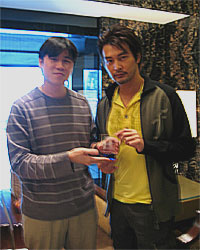

(above) Andrew Lin with LoveHKFilm webmaster Ross
Chen, and the LoveHKFilm Award for Most Underrated
Performance.
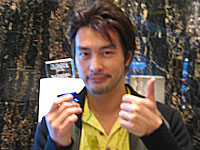
Andrew Lin
on his movies:
We presented Andrew
with some DVDs of films
from his career. These
are his comments:
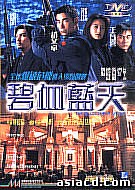
The Blacksheep Affairs
"That was my first film in Hong Kong, my first
major lead. We shot in Hungary. It was the first time
I played a big villain. I had to do a lot of fighting,
a lot of martial arts. What's interesting is a lot
of people remember me from this film. When they talk
to me, they actually ask me about this film. I guess
it was because it was my first film, so it made some
impact on them."

The Accident
"That was my third film and the first time
I had to do love scenes. They were with Almen Wong.
I was quite nervous. It was a big jump, in terms of
acting. I was starting to learn how to act through
my body. The story is okay. Not that good, but not
that bad either."
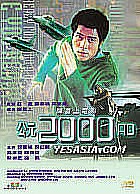
2000 AD
"When I first talked with the directors,
the script was really good. But when we got to Singapore,
the production company there, the stuff they promised
-- the locations -- weren't available. So we had to
change the script in Singapore right away. So, the
second half is not as good as the first half. The
first half was planned for a long time, but the second
half was planned in only a few days."
"What I really remember is my costume. I hated
it. I was wearing cowboy boots and a cowboy shirt.
I don't know why. I guess the costume designer thought
that since I was playing an American government agent,
I should be in a cowboy outfit. An American cowboy
-- they made that connection. I don't know why, but
I was a cowboy in that film."
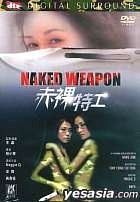
Naked Weapon
"I received no direction [for playing his famously
over-the-top villain in the film]. I was sick and
tired of playing villains. I wanted to play something
different. Instead of playing a cool, sharp-looking
villain, this time I wanted to be do something else.
That was the variation I came up with."

Rob-B-Hood
"I'm in The JC Group, so I was obligated to play
a role in the film. I played Cherrie Ying's husband,
Baby Matthew's father. There's not much to talk about
really. It was a five-day shoot for me, but they cut
most of my scenes so it became like a two-day shoot.
The first scene is me and Cherrie in the hospital
with her giving birth. That scene is actually longer,
you can see the whole process, from the beginning
of her pain to the baby's birth, but they cut it.
It's actually pretty funny."
"There was also a scene about me and Cherrie
in the house, very worried about the missing baby,
but that was cut out too."
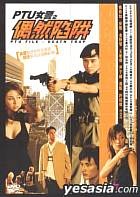
PTU File - Death Trap
"Actors need to make money."
How
This Happened
Previous
to this meeting, LoveHKFilm.com
has never officially met with any HK Entertainment
personalities. We're
glad that Andrew Lin accepted to meet with us because
because he was honest and down-to-earth, plus he wasn't
angry with us for what we said about Wife From
Hell.
The circumstances for this happening were circuitous
and rather coincidental, but here's the short version:
somehow Andrew Lin heard of the LoveHKFilm
Awards
and posted it on alivenotdead.com.
Coincidentally, one of the Webmaster's friends knows
Terence Yin, who of course knows Andrew Lin. A week
or so later, we managed to put this thing together,
which in total required eight phone calls and an extra
week to prepare the first ever physical LoveHKFilm
Award, a blue-and-clear glass bauble that turned out
a lot nicer than we thought it would.
The
long version of this story would take an extra three
pages so we'll spare that for a later day.
Special
Thanks to:
Sean Tierney, Winnie Chan, Paul
Hong and of course Andrew Lin.
|
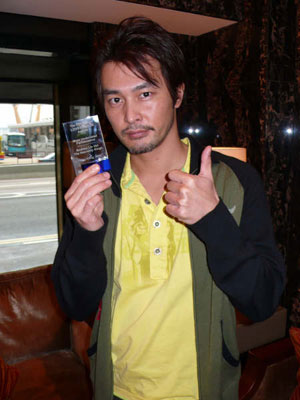
In an unexpected event, actor Andrew
Lin met with LoveHKFilm.com
staff to accept the LoveHKFilm
Award for "Most Underrated Performance",
earned for his underappreciated work in the 2006 mockumentary
The
Heavenly Kings. The film was also among
LoveHKFilm.com's
"Top Ten Films of the Year", announced on
February 22, 2007, as part of the 2006
LoveHKFilm Awards.
The "Most Underrated Performance"
Award is given in recognition of a good performance
by an actor that was not noticed or appreciated by the
media, award-giving bodies, or the general audience.
In The Heavenly Kings, Andrew Lin played
himself, but not in an exaggerated or expected manner.
Lin was sympathetic and surprisingly likeable as a seemingly
humble, yet quietly vain actor, who uses his friends
as a way to boost a flagging acting career. The role
brought an extra layer to the film's entertainment industry
satire, painting artists as not just unfortunate victims,
but also conniving opportunists.
Andrew Lin graciously met with LoveHKFilm
on March 18th, 2007, at the Mandarin Oriental Hotel
in Central, Hong Kong, where we shared a cup of coffee
and talked about his career, The Heavenly Kings,
and the Hong Kong entertainment scene in general.
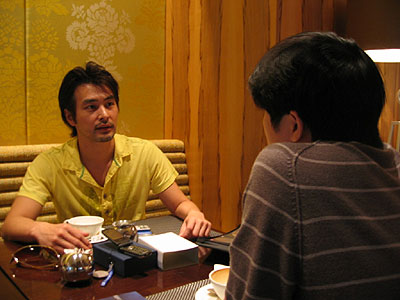
Lin first gained notice in the 1998 Ching
Siu-Tung actioner The Blacksheep Affairs, playing
the villain opposite Zhao Wen-Zhou and Shu Qi. The role
launched a promising career, but unfortunately, the
late nineties also saw a crisis for the Hong Kong film
industry, with declining attendance, piracy, and reduced
investment preventing actors and filmmakers from producing
the variety and output of films that drove the industry
to international prominence in the late eighties and
early nineties. As a result, many actors and filmmakers
were marginalized, never getting the opportunities they
might have received if the industry were more robust.
One could say Andrew Lin's career fell into that category.
Though Lin displayed plenty of range in smaller films
like Julian Lee's The Accident or Derek Chiu's
Love Au Zen, he was frequently cast as the bad
guy in larger, more commercially-driven productions.
In the biggest films with the most exposure, Lin usually
had to be the baddie opposing the top-billed star, be
it Aaron Kwok (2000 A.D.), Louis Koo (GOD.COM),
or fellow Alive member Daniel Wu (Naked Weapon).
To general audiences, Andrew Lin was usually the heavy.
Lin was able to control his destiny a bit for The
Heavenly Kings. Lin worked with friends and fellow
actors Daniel Wu (who also directed), Terence Yin, and
Conroy Chan on the project, and the four got to play
themselves -- with the added twist that they could play
with their own image. "We didn't know what to do
with my character at first," Lin recalls. "Terence's
personality is a bit stronger, he's a party animal,
and the press always writes about him that way. So Daniel
tried to use that and exaggerate it. But for my character
-- my life in the business has been sort of subtle,
so we tried to paint a contrast to the types of characters
I played before, I've played a lot of villains and baddies,
so I wanted to play the reverse."
Lin did play the reverse. His character,
"Andrew Lin", is portrayed as a shrewd, calculating,
yet somewhat pathetic actor who entreats his buddies
to start a boy band simply to save his failing career.
"I wanted to play a small man, someone who's selfish,
who's very aware of what he's getting out of things.
You know, just something different, something totally
different than what I've played before."
Lin succeeded, though people came to confuse
Andrew Lin with "Andrew Lin". "People
think a lot of parts [of The Heavenly Kings]
are real. For example, the part about my father -- most
people see that as real. But they never really came
up and asked me about it. The way I said it in the film,
it sounded like my father had passed away already. When
I tell them that the scene isn't real, the reaction
is, 'Oh, really?!?'" Lin adds, "My father
is alive, by the way."
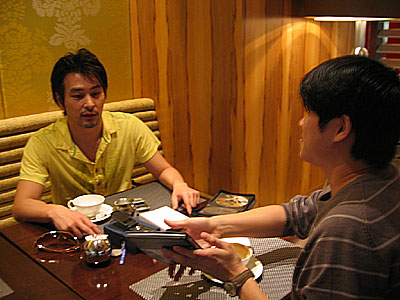
The Heavenly Kings gave Lin and
his fellow Alive members a way to critique Hong Kong's
famously gossip-fixated media. For Lin, who hails from
Taiwan, the Hong Kong media was a bit of a culture shock.
"Hong Kong and Taiwan are very different. I started
out in Taiwan. In Taiwan, the press works differently
than in Hong Kong."
"For example, it's like today [this
meeting]. Your management company would write an article
about you and send it to the press, and if the reporters
like the subject, they'll print it tomorrow. But in
Hong Kong, they really don't want to print something
that serious. If you caught me going out with this other
actress, it would be on the front page about this big."
Lin indicates a six-inch space. "But our article
[about this meeting] would be about this big."
Lin indicates a space of about two centimeters."So
that's something I've learned in Hong Kong: the media
is very much different from Taiwan."
Lin sighs, "But the worst thing is that [the media
in] Taiwan is starting to learn from Hong Kong."
Lin still has an affection for Hong Kong
movies, but he admits that he doesn't watch so many
anymore. "Since I'm working as an actor in Hong
Kong, I can pick up the quality of the film just by
looking at the production. It's really easy if you're
in the business. There's value in commercial film, but
I'm kind of disappointed in it now. It's so much about
the business more than the art itself."
"Before when we watched Hong Kong
Films, they was commercial, but they were still pretty
good. There was still some art value to them. Now it's
all about the business side, the box office side. Now
even the genre or the story has to appeal to China.
Everything's so formulated."
Reduced output and financial considerations have hurt
some of Lin's chances at roles. "The worst part
is they use the same actors. The investors want someone
who can get box office numbers. It doesn't matter if
you're a good actor or not. Look at Lau Ching Wan. He's
not acting anymore, I don't know what's going on. He
does one film a year. He's working less and less."
"But as an actor, when I get a job, I get paid,
so I can't complain."
Lin's experience as an actor -- and the frustrations
that come with it - - was one of the driving forces
behind The Heavenly Kings. "The actor is
very passive," Lin relates. "We have to wait
for a job. Unless it's something like this [The Heavenly
Kings]. We invested in it so we could make a film
to express how we felt."
The Heavenly Kings certainly did express what
Lin and his friends felt, delivering a satirical and
sometimes scathing look at the Hong Kong music industry
and the ridiculous media attention that comes with it.
The film struck a chord with a small audience, but the
general public didn't turn the film into anything resembling
a bonafide box office hit. Lin states that this was
expected. "The film wasn't for the general audience.
The film wasn't very commercial, so the box office wasn't
that great. I don't think that most of the Hong Kong
audience have seen the film yet."
Lin is adamantly positive about the experience, however,
placing art firmly above commerce with The Heavenly
Kings. "We made this film for ourselves. We've
kept our feelings in for so long, and we wanted to express
it by making a film. When we started out, we never thought
about making any money out of it. We're not in debt.
We made some money, but not that much. That wasn't the
primary goal, to make money."
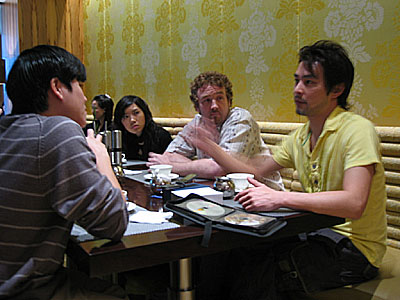
The creation of Alive, and the critical success of
The Heavenly Kings did create some new opportunities,
however. "Since we made this film, our production
company is still there," Lin says. "We're
thinking about doing more films later."
"Actually, we [the four members of Alive] shot
a few short films for a commercial. We're spokespeople
for a new drink, and we got to shoot four 5-minute short
films. We came up with four different stories for the
four of us."
Like with The Heavenly Kings, Lin and his crew
did things their own way. "Instead of shooting
a commercial about me holding a drink, we wanted to
shoot something different. We have a slogan, 'what's
your color?' The film is about what is my true color.
What do I want to do with my life?"
Lin promises that the answer -- which will be unveiled
when the commercials premiere later in 2007 -- will
surprise and entertain people. From all indications,
Lin's short film promises to channel the same irreverent,
shoot-from-the-hip filmmaking verve that made The
Heavenly Kings one of 2006's most enjoyable films.
Given the last decade's dearth of creativity, Hong Kong
Cinema could use a few more movies like this.
The "Andrew Lin" in The Heavenly Kings
may be a selfish guy looking only for his own gain,
but the real Andrew Lin is not a small man at all. Recently,
Alive performed at the Hong Kong Film Awards, using
their performance slot as a way to announce the "death"
of Alive, as well as promote local artists, including
bands Hardpack and Audio Traffic. The boys of Alive
also just updated their website, www.alivenotdead.com,
transforming it from a promotional site about Alive
into "an online artistic community for artists
and fans to share their personal expressions of inner
creativity and passion." Alive may be dead, but
their bohemian dream lives on.
Originally published: May 14th, 2007
(above) Even more photos of Andrew
Lin.
You'd be surprised at how many of the photos we took
aren't usable.
|